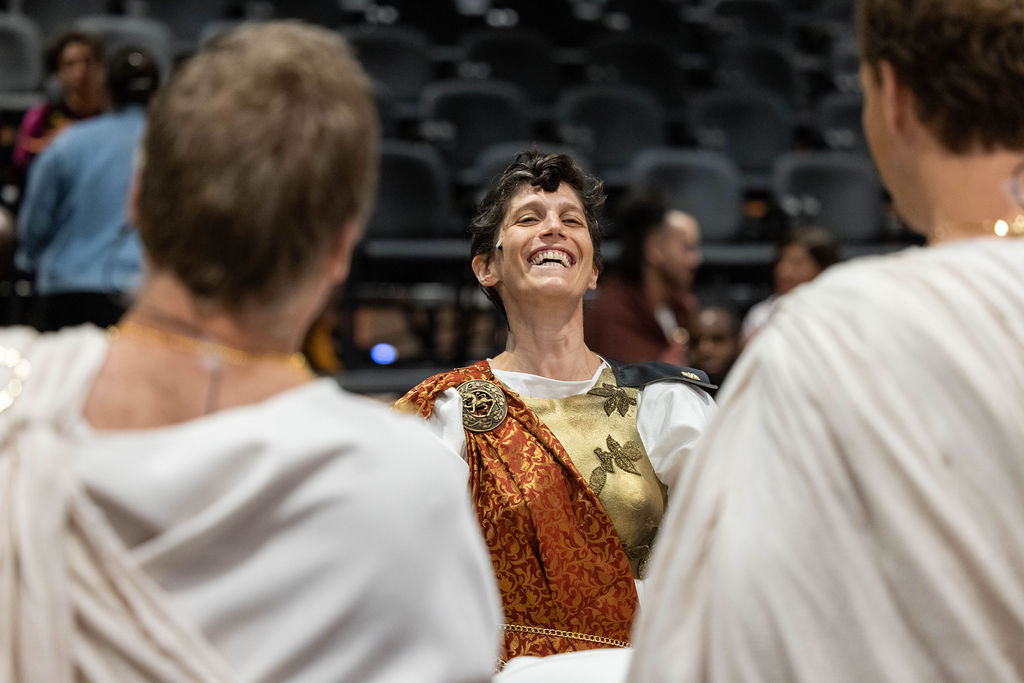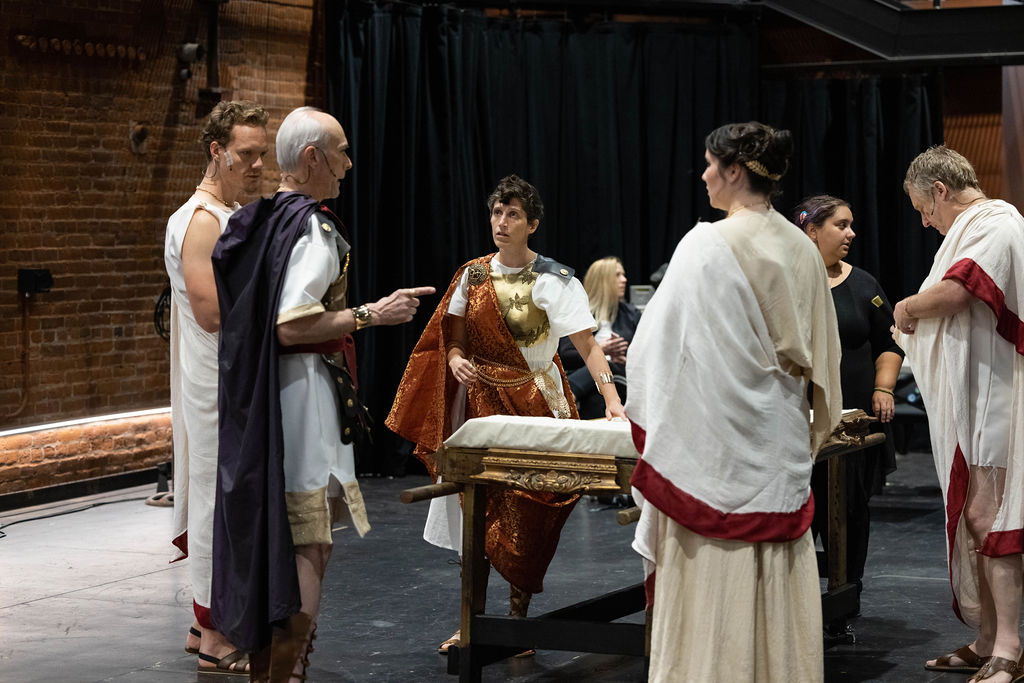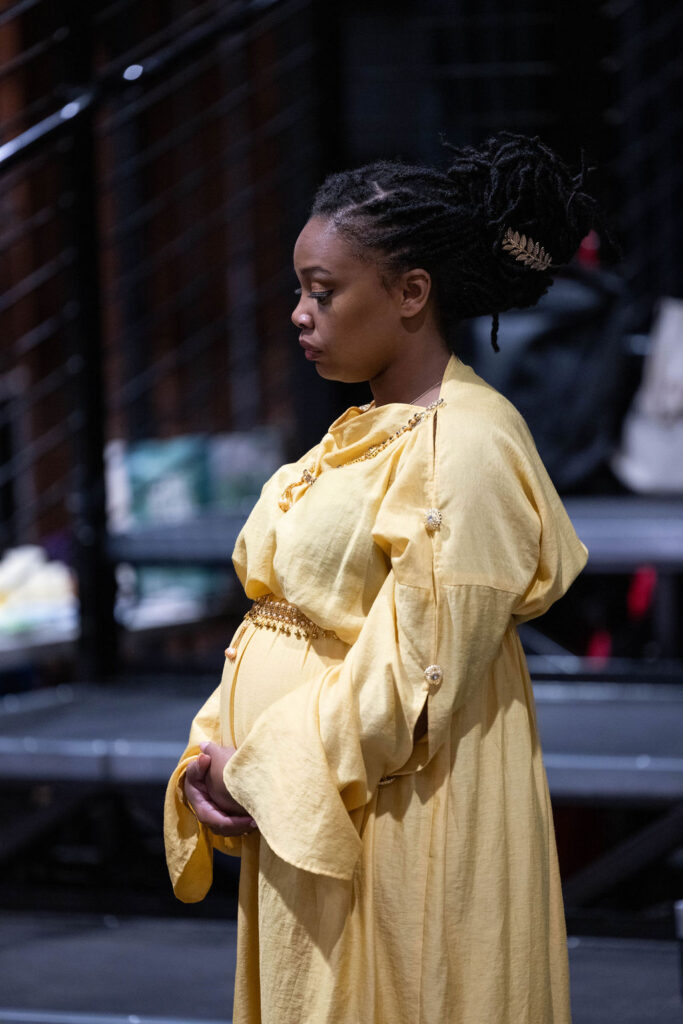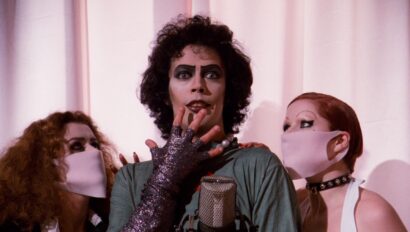Behind The Scenes with Livy Scanlon and Adapting Julius Caesar for Worcester

Hank Stolz spoke with Ashleigh Prince and Olivia Scanlon about adapting Julius Caesar for Worcester. Read on for highlights from the interview, or listen to the full interview below. Then tune in to Talk of the Commonwealth with Hank Stolz on WCRN 830AM Fridays at 9 AM and Saturdays at 1 PM for more behind-the-scenes interviews.
Hank: Time now for Behind the Scenes with The Hanover Theatre! Lisa Condit is off today, your host is Ashleigh Prince. Ashleigh, good morning.
Ashleigh: Good Morning Hank!
Hank: Well, first of all you have a very special guest that we’re going to be bringing Liv in in just one second. Thank you so much for coming in, there’s a lot happening at The Hanover Theatre.
Ashleigh: Yes! Liv is the mastermind behind our production of Julius Caesar, and I wanted to bring her on today so that we could talk about the inner workings of Julius Caesar and how the casting choices are really going to effect this production.

Livy: Let’s do it!
Hank: Yeah Liv, tell us a little bit about these casting decisions… The cast has been announced, we’ve had some of them on. But as I understand from Ashleigh and Lisa from some of our past conversations, you’ve really switched some things up!
Livy: Yeah, for sure. There’s a bunch going on here, so let’s talk about the original. As Shakespeare wrote Julius Caesar, there’s something like 50 roles, and only two are for women. All the rest of them are for men. As Shakespeare is traditionally cast, coming out of a European tradition and coming to America, it’s usually cast with white folks. That’s the tradition that were coming out of. America has changed a lot since Shakespeare wrote his works, so there are a few things I’ve done with the cast.
Livy: First of all, I’ve cut it way down. I’ve compiled a bunch of characters into one character, so I have a cast of twenty instead of 50-something. We’ve also done some non-traditional casting in terms of gender. We have a woman playing the role of Cassia, who is usually known as Cassius, a male character. We have a woman playing Antonia, whose usually better known in history as Marc Anthony. We have also cast Caesar to have a husband instead of a wife. What I am endeavoring to reflect there is the fact that women in our day and age hold positions of power and to further normalize that trend.
“With Cassia and Antonia, we’re normalizing and reinforcing that woman can hold positions of power, and its not an unusual circumstance.”
Livy: And then with Calpurnius, we’re reinforcing that there are LGBTQ people in our world. In this instance, I thought that casting Caesar to have a husband instead of a wife would put Caesar in a marginalized group and that would complicate his character. It would make him more complex; it might help us understand why he, in moments, seems to be overly and toxically masculine, why he is so hell-bent on asserting his power and masculinity. That’s some of the gender casting I’ve been toying around with.
Livy: As far as breaking up the European-American tradition of casting Shakespeare with mostly white folks, we have a very racially diverse cast. Perhaps most notably Brutus who is the protagonist of the show and by far has the heaviest line load, is being played by an actor who is black, Joshua Wolf Coleman, and he is a wonderful actor. The actor playing his wife, the character’s name is Portia, is also being played by an actor who is black. Her name is Lizzy Brooks, she is an extraordinary graduating student from the Brown University Trinity Rep MFA program down in Providence. We have racially diverse actors in a number of roles: the Soothsayer, Octavius Caesar, Lucius who is sort of the faithful page to Brutus and Portia…
Then at the way other end of the spectrum, I’ve started this Worc at Play actor training program for adult Worcester residents who are interested in learning acting. This was a program that was open to anyone 18+ living in the Greater Worcester area, including absolute beginners. I had about 35 adults come out for the project, and from them, I selected 6 actors. Of those 6 beginner, young adult actors, 3 are immigrants to this country. 2 are from Uganda, 1 is from Brazil and they’re along for the ride too.
This is a wide range of everything, with unbelievably seasoned professionals in the principal roles, to these Worc at Play actor trainees learning acting and filling the ensemble roles.
Hank: There is a lot happening there! It’s interesting because with Julius Caesar and Shakespeare, the themes of power have resonated throughout history. Every generation, depending on what is going on, will put what’s happening in Julius Caesar up against what we’re experiencing in our own lives. How do you think the casting you just talked about changes the way we experience these themes of power in Julius Caesar?

Livy: I’m setting it in Ancient Rome to avoid drawing strict parallels between the characters and today’s politicians. We’re not trying to tell the story that Caesar is Trump, or Brutus is Obama, or Cassia is Nancy Pelosi. That was done in New York right when Trump was elected where Trump was Caesar, and I just don’t think that’s helpful right now. What I am trying to do is to say “ The specifics are different, but at its core, what was going on in Rome, is going on in our country right now.” There is deep, deep divide amongst politicians and amongst the people in terms of what we believe our democracy is or what we think is healthy. Both in the play and in America.
People at every level from the most powerful to the powerless are taking matters into their own hands and abandoning the principles that hold our democracy together, so I’m trying to make that broader parallel between ancient Rome and America today. In terms of the non-traditional aspects of the casting and diverse casting, you know, people are really going to bring their own baggage to the table.
There’s nothing in the text about Caesar being gay, there’s nothing in the text about Brutus being a black man in our production of the play. We’re saying these characters are women, but beyond that, there’s nothing said about Cassia or Antonia being women, they just are. Audiences are going to have to sit with their own prejudices, and alliances.
Hank: Ashleigh, you’re working really hard to get this out to the public and it’s going to be performed on the common!
Ashleigh: Yes, and you can reserve seats now for free! It’s better for you in the long run and we still have spots open! You can go to thehanovertheatre.org/juliuscaesar to reserve your seats in the Worcester Common Oval. I think this is so exciting because it’s accessible theatre. You don’t have to have a big wad of cash in your wallet to get a ticket. You can just walk up and enjoy live, wonderful and groundbreaking theatre!
Hank: This is for the people, for the masses. If you learn something, ok, but this is great entertainment for a wonderful summer night to be out on the Common and have a lot of fun!
Livy: Yes! I said this to the cast… Julius Caesar is regarded by Shakespeare scholars to be a tragedy. I think of it more like a political thriller. It’s very suspenseful, there’s actually like a good deal of humor in it, and then it is very sad at the end, but it’s very entertaining. I’ve cut it to be around 90 minutes and we’re going to have a quick intermission. The language is very accessible and every performance is made available free and open to the public. If there are available seats on a given night, once we hit the stroke of 7:30 we will make those available for walk-ups. It’s going to be much less like going to a museum and more like going to a ball game. That’s the goal anyway! We’ll be seating people at the round wrought iron tables that the city provides in the Worcester Common Oval.
Ashleigh: Accessible theatre for the win!



